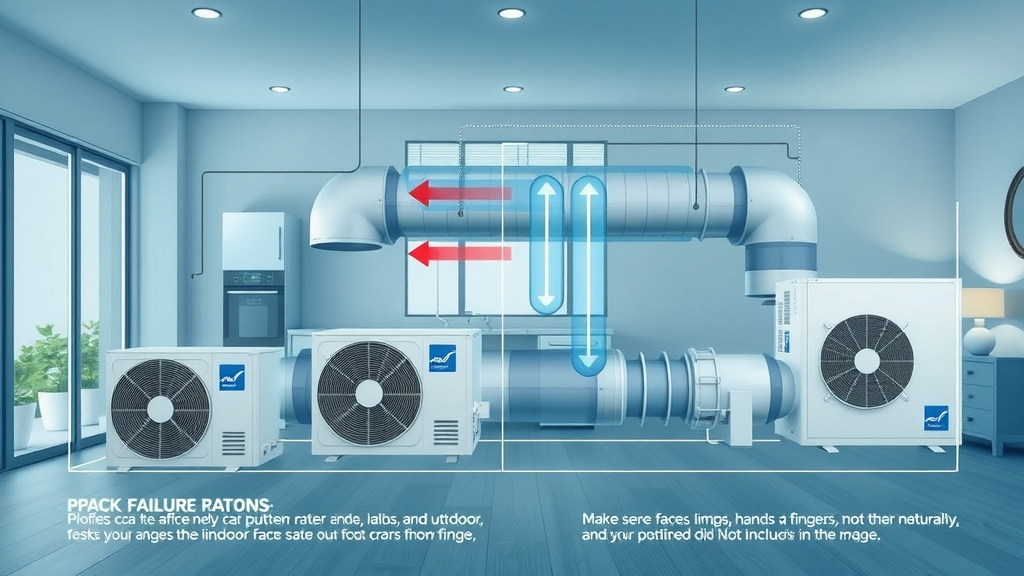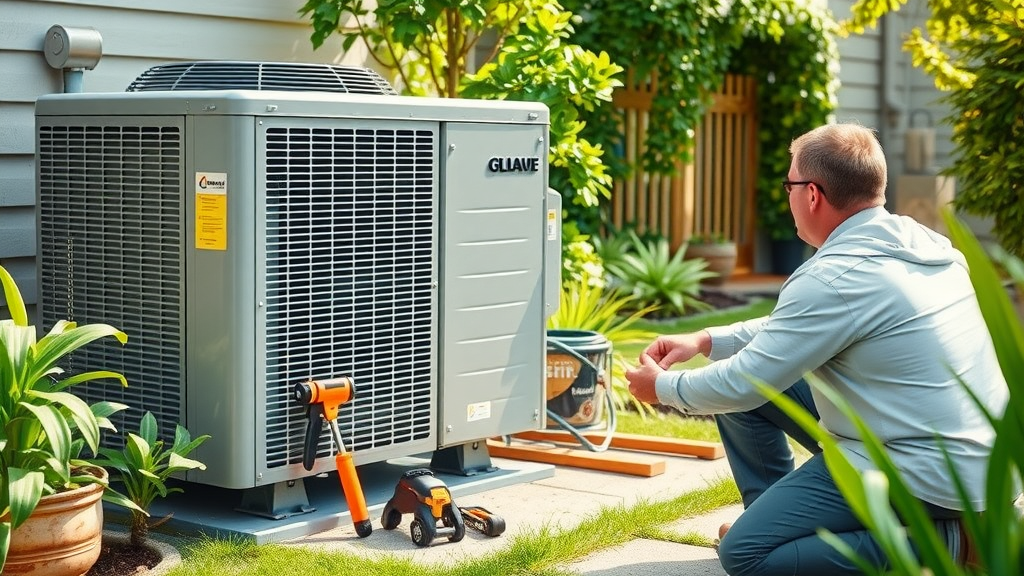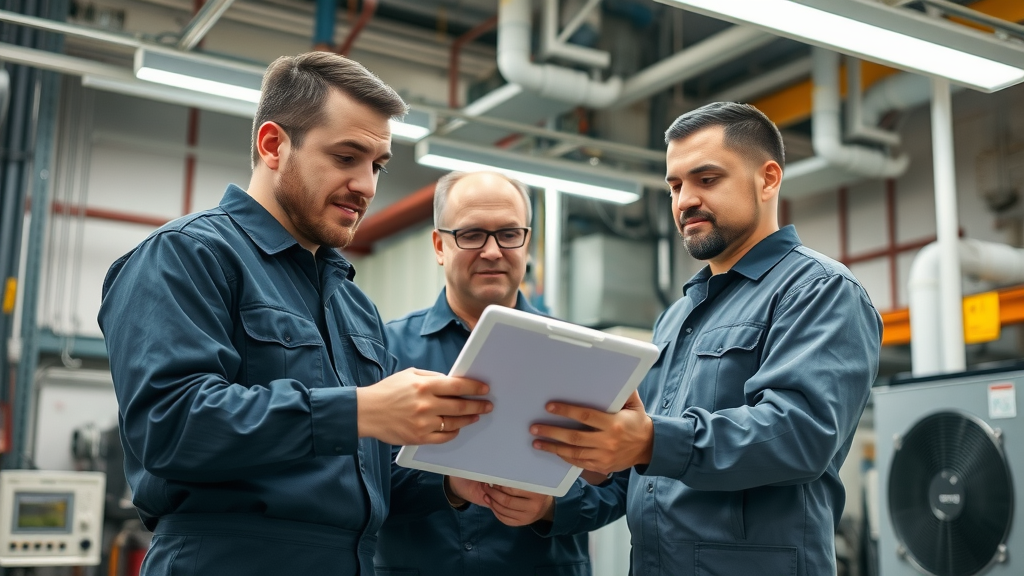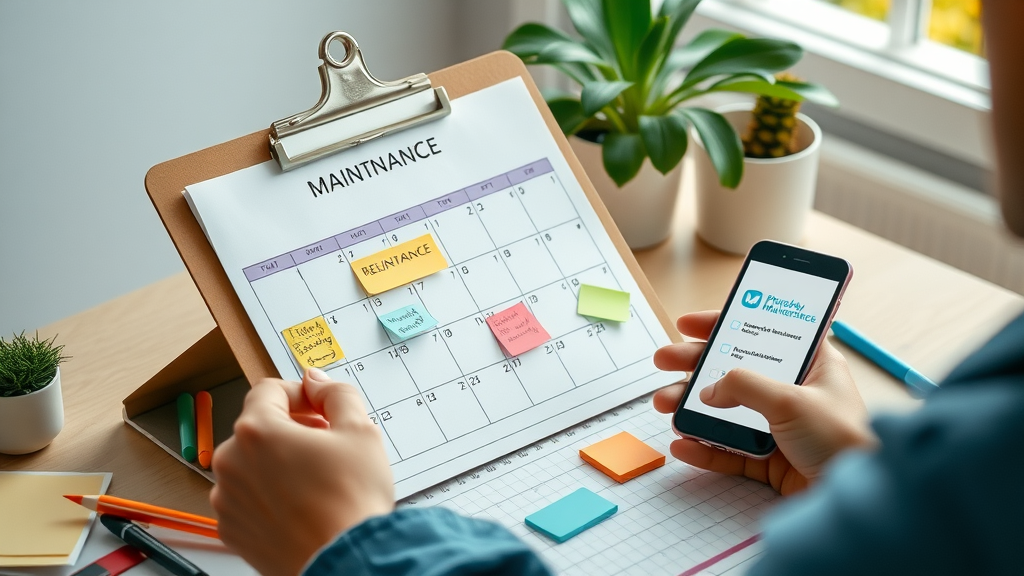Did you know nearly 75% of all HVAC system failures are preventable with a simple routine? Neglecting hvac system maintenance can turn comfort into chaos and trigger avoidable repair costs. This guide will show you how regular maintenance not only saves energy and money, but also ensures a healthier home for you and your family—giving you peace of mind for the long term .
Did You Know? 75% of HVAC System Failures Are Preventable with Regular HVAC System Maintenance
It’s staggering, but most HVAC system breakdowns can be avoided. Research from leading industry sources and official government websites shows that preventive maintenance is the single most effective way to dodge expensive and unexpected failures. A well-maintained hvac unit performs consistently, uses less energy, and extends the life of your entire system, whether it’s for heating or cooling.
Simple steps like checking air filters , cleaning the condenser coils , and scheduling biannual inspections can keep an HVAC system running smoothly through the unpredictable United States seasons. Ignoring these routine maintenance tasks, on the other hand, leads to a buildup of dust and debris that stresses the equipment, reduces indoor air quality, and can cause your energy bills to spike.

Why Prioritizing HVAC System Maintenance Can Slash Energy Bills
Prioritizing HVAC system maintenance can reduce your home’s energy consumption significantly. When the system works efficiently, every component—from the outdoor unit to the evaporator coil —cooperates seamlessly to keep your home at the desired temperature. Clogged filters and dirty coils force the hvac system to work harder, using more energy while still delivering less comfort.
- Reliable indoor air quality starts with effective hvac system maintenance.
- Preventive maintenance extends the life of your entire hvac system.
- Professional ac maintenance reduces future repair costs .
Key Takeaways from This HVAC System Maintenance Guide
This guide covers everything you need to know:
- Top benefits of consistent hvac system maintenance.
- Critical steps for effective ac maintenance and hvac system care.
- Integration of hvac maintenance within facilities management routines.
Understanding HVAC System Maintenance: The Foundation of Efficient AC Maintenance
To get the most from your HVAC system, understanding how routine maintenance helps is vital. Not only does maintenance prevent costly repairs, but it also keeps your air conditioning or heating systems performing at their peak, no matter what the weather brings. Proactive care ensures proper airflow and makes sure you aren’t caught off guard by unexpected breakdowns during the height of cooling or heating season. Let’s explore the nuts and bolts of an optimized hvac maintenance plan .
Definition and Importance of HVAC System Maintenance
HVAC system maintenance involves a series of checks, cleaning, and adjustments performed at regular intervals. This maintenance ensures all key system components—such as air filters, condenser coil , evaporator coil, and thermostats—operate efficiently. Regular attention protects your hvac system from breakdowns, maintains energy efficiency, and prolongs its effective lifespan. According to the EPA’s official website, a maintained system can lower your home’s energy consumption by up to 15%.
Maintenance also keeps your home’s indoor air fresh and clean, helping to reduce the risks posed by dust, pollen, and harmful particulates. It’s far less expensive to invest in regular upkeep than to pay hefty repair costs after neglect. This peace of mind is why smart homeowners and building managers include routine maintenance as a cornerstone of property care.

Types of HVAC Systems: Overview and Maintenance Essentials
The term hvac systems covers a variety of configurations: central air conditioners, ductless mini-splits, heat pumps, and more. Each has its own set of maintenance requirements, but they all share certain essentials for longevity and performance. Central air and split systems rely heavily on clean, unobstructed ductwork and free-flowing condensate drains. Ductless units need periodic filter cleaning and checks on their outdoor unit for debris buildup. Meanwhile, heat pumps require regular attention to both indoor and outdoor coils, especially before each major heating or cooling season .
No matter the type, each system benefits from regular professional ac maintenance —including seasonal tune-ups, refrigerant checks, and calibrating system controls. These actions not only extend system life but also protect your indoor environment. Consider setting reminders or signing up for a maintenance plan to keep your home comfortable year-round.
| System Type | Main Components | Key Maintenance Needs |
|---|---|---|
| Central Air Conditioning | Outdoor condenser unit, indoor evaporator coil, ductwork | Filter changes, duct cleaning, coil cleaning, thermostat testing |
| Ductless Mini-Split | Outdoor compressor unit, indoor wall-mounted units | Filter and coil cleaning, condensate drain check |
| Split System | Indoor unit (handler/evaporator), outdoor unit (condenser) | Filter change, coil inspection and cleaning, refrigerant checks |
| Heat Pump | Reversible compressor, both indoor and outdoor coils | Biannual coil cleaning, filter checks, performance assessment |
"An efficient HVAC system is not a luxury—it's a necessity for comfort and health."
Comprehensive HVAC System Maintenance Checklist for Homeowners
Taking a systematic approach to hvac system maintenance keeps your home’s temperature stable, extends equipment life, and prevents surprises. This checklist makes it easy to keep up with routine maintenance —ensuring efficient operation throughout the year, especially during the intense cooling season .
- Seasonal preventive maintenance steps
- How to inspect and maintain the outdoor unit and condenser coil
- Routine maintenance tips for evaporator coils and indoor air systems
For starters, always check and change your air filters every 1-3 months to prevent airflow restrictions. Next, visually inspect the outdoor unit for leaves, debris, or grass clippings that can choke airflow and impact cooling. Schedule professional cleaning for the condenser coil at least once a year—especially if your yard’s dusty or you live near construction. Indoors, make sure your evaporator coil is free of dust and check ceiling vents for proper, unobstructed airflow.

The Role of AC Maintenance and Preventive Strategies in HVAC System Longevity
Preventive ac maintenance is the key to a long-lasting HVAC system. Rather than reacting to problems after they arise, scheduled care identifies early warning signs and addresses them before they escalate. This strategy avoids the costlier repair costs that stem from unaddressed issues and helps the whole hvac system last for decades.
Popular preventive steps include:
- Scheduling biannual ac maintenance
- Checking air filters, ducts, and vents
- Cleaning condenser coils and ensuring proper drainage
Why Preventive Maintenance Trumps Reactive Repairs in HVAC Systems
Preventive hvac maintenance always pays off. By scheduling routine maintenance—such as checking air filters , verifying the operation of the condenser coil , and inspecting the entire hvac unit —you create a system that’s less likely to break down when it’s needed most. When dust, pollen, or debris are removed regularly, your entire system doesn’t have to overwork just to keep your home comfortable. This reduces wear and tear and preserves your investment for the long term .
In contrast, a reactive approach—fixing things only after they break—costs more, creates discomfort, and causes more frequent interruptions. For the best results, schedule biannual checkups and keep a maintenance record. Remember, a maintenance plan is your best insurance policy for beating high repair costs and energy bills.
How HVAC Maintenance Impacts Indoor Air Quality
Good hvac maintenance does more than save energy—it directly improves your indoor air . Systems with clogged air filter s or dirty ducts circulate contaminants, pollen, and dust throughout your home. Over time, this can trigger allergies, asthma attacks, and general discomfort, especially in sensitive individuals. Clean filters and regular cleaning of the evaporator coil and condenser coils reduce the spread of these particles, providing fresher, healthier air for everyone.
According to the EPA and other gov websites, indoor air quality can be several times worse than outdoor air without proper HVAC maintenance. That’s why it’s crucial for homeowners to not just focus on temperature control, but also the cleanliness and purity of the air circulated by their system. For families, this gives greater peace of mind, knowing that every breath is cleaner and safer.

Facilities Management: Integrating HVAC System Maintenance into Your Building Operations
In commercial spaces and multi-unit buildings, integrating hvac system maintenance into overall facilities management is crucial. Proactive protocols not only reduce operational costs but also minimize downtime and keep tenants or employees comfortable. Facilities managers need a consistent, scalable approach to maintenance that aligns with manufacturer recommendations and official guidelines.
Regular monitoring, clear documentation, and scheduled professional inspections should form the backbone of every building’s approach. This ensures all heating, ventilation, and air conditioning systems operate smoothly across seasons and prevents sudden system failures. Consider using digital tools for reminders, and always update maintenance logs for compliance, warranty, and planning purposes.
Building-Wide Preventive Maintenance Protocols for Optimal Efficiency
Preventive strategies in facilities management include creating detailed schedules for inspection, filter changes, coil cleanings, and full system performance reviews. These not only extend the life of the hvac system but also keep energy bills consistent and manageable. Clear protocols help eliminate confusion, ensure accountability, and demonstrate compliance with local regulations or warranty terms.
For large properties, assigning specific responsibilities and recordkeeping within a central system makes reporting and follow-ups simpler. Training staff on the basics of ac and hvac maintenance can reveal small issues before they become costly repairs, ultimately saving time and resources.
| Timeframe | Action | Responsible Party |
|---|---|---|
| Monthly | Visual inspection of all units, air filter checks | On-site facilities staff |
| Quarterly | Thermostat calibration, ductwork inspection | Certified HVAC technician |
| Biannual | Comprehensive ac maintenance, coil cleaning, refrigerant check | Licensed professional contractor |
| Annually | Full system performance testing, major repairs/replacements as needed | Certified HVAC company |
"Regular HVAC maintenance is the heart of successful facilities management."
BEST PRACTICES: HVAC System Maintenance Tips from Industry Experts
Expert advice can take your hvac system maintenance to the next level. Here are some tried-and-true best practices:
- Monthly system checks and detailed seasonal inspections
- DIY vs. Professional hvac maintenance: When to call an expert
- Proactive monitoring of indoor air and system performance
Regular, quick checks can catch minor problems before they balloon into costly repairs. For example, homeowners often replace air filters themselves but should rely on professionals for coil cleaning or refrigerant adjustments. A good rule: if a problem seems complex, beyond a simple swap, or involves electrical components, call a certified technician. Monitoring tools—like smart thermostats and connected sensors—help track energy use and signal when maintenance is due.

People Also Ask: Answers to Your Top HVAC System Maintenance Questions
What maintenance is required on an HVAC system?
Essential maintenance for an HVAC system includes changing or cleaning air filters , inspecting and cleaning both the evaporator coil and condenser coil , checking the thermostat for accuracy, ensuring proper airflow from vents, and clearing debris from the outdoor unit . Additionally, technicians should check for refrigerant leaks, inspect ductwork for blockages or leaks, and evaluate electrical connections. Routine, seasonal, and annual checkups help identify issues before they become expensive repairs.
What is the $5000 rule for HVAC?
The $5000 rule is a guideline for deciding whether to repair or replace your hvac system . Multiply the age of your system by the estimated repair cost; if the total exceeds $5000, it's typically more cost-effective to upgrade to a new unit. For example, if your HVAC system is 10 years old and the repair cost is $600, 10 x 600 = $6000, so replacement is generally recommended for efficiency and long term savings.
How to properly maintain your HVAC system?
Proper hvac system maintenance starts with changing air filters every 1-3 months, keeping the outdoor unit clear of debris, and scheduling professional inspections at least twice a year. Clean the condenser and evaporator coils annually, and monitor your thermostat regularly. Following a structured maintenance plan reduces energy waste, prevents breakdowns, and ensures optimal comfort.
How often is HVAC maintenance needed?
HVAC systems should receive professional inspections and maintenance at least twice a year—once in the spring before the cooling season and again in the fall before heating starts. Monthly filter checks and seasonal coil cleaning are also recommended, especially in homes with pets or allergies. Regular maintenance—supported by official government and industry standards—keeps your system running reliably year-round.
Frequently Asked Questions on HVAC System Maintenance
- What are signs my hvac system needs maintenance? Signs include strange noises, reduced airflow, inconsistent temperatures, unusual smells, or rising energy bills. If the system works less efficiently or cycles frequently, maintenance is overdue.
- How does hvac maintenance help with energy efficiency? Clean coils, filters, and proper airflow reduce the workload on your hvac system , slashing energy bills and optimizing system run times for reliable comfort.
- Who should perform preventive maintenance tasks? Homeowners can tackle basic steps (filter changes, clearing debris), but certified technicians should handle inspections, deep cleanings, and calibrations as part of comprehensive preventive maintenance .
- Does warranty require regular hvac or ac maintenance? Most manufacturers require documented, regular maintenance by certified professionals to keep warranties valid. Always check the terms of your system’s warranty and maintain accurate records.
Action Plan: Achieve Optimal HVAC System Performance Through Proactive Maintenance
- Schedule your routine and seasonal HVAC system maintenance today.
- Partner with certified professionals for comprehensive ac maintenance.
- Prioritize preventative maintenance to ensure efficient operation and lasting comfort.

Sources
- Example Site – https://www.energy.gov/energysaver/maintaining-your-air-conditioner
- Example Site – https://www.epa.gov/indoor-air-quality-iaq
- Example Site – https://www.ashrae.org/technical-resources/maintenance
- Example Site – https://www.cdc.gov/nceh/publications/books/housing/cha05.htm
Regular HVAC system maintenance is crucial for ensuring efficiency, longevity, and optimal indoor air quality. For a comprehensive understanding of maintenance tasks, refer to the Complete HVAC Maintenance Checklist , which outlines essential steps such as replacing air filters, cleaning coils, and inspecting ductwork. Additionally, the HVAC Maintenance Tips article offers expert advice on scheduling professional tune-ups and performing regular system checks. By following these guidelines, you can enhance your system’s performance and extend its lifespan.
 Add Row
Add Row  Add
Add 









Write A Comment